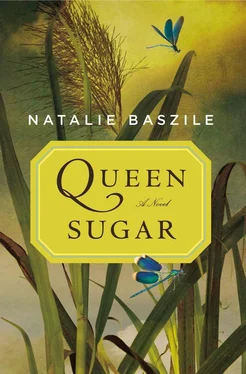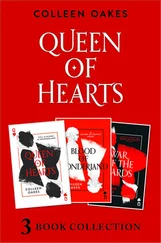“But I was counting on you. I’ve been paying you.”
Frasier pulled two checks from his breast pocket, handed them to Charley, and she saw that they were the ones she’d mailed weeks ago. “I’ve asked around. Problem is, this time of year, anyone worth hiring has already signed on for a job.”
Charley touched Frasier’s jersey as if it were the hem of his royal robe. If he wore a ring she would have kissed it. She would have knelt if he’d asked her to. “Please, Mr. Frasier. Wait one season. You’ve put me in a terrible bind.”
Frasier looked at her with great sympathy. “Your daddy was a good man,” he said. “I never met him in person, but I could tell. And I can tell you’re a good person too.” He brushed his hands on his pants. “But two more months and I get my union card. I’ll have benefits.”
“We both know I can’t run this place by myself. Please. I’m begging you.”
“It only seemed right to tell you in person.”
Charley looked out at her fields. The cane seemed to have withered even more in the hour since she arrived. Birds, whose chipper singing she hadn’t noticed until now, seemed to mock her with their chatter. “All this time and you never said a word.” A tremendous lump thickened in her throat and she turned away, willing herself not to cry. She fully expected Frasier to leave, but he waited patiently, hands wedged deep in his back pockets.
“If you’d like to go over things,” he offered.
Somehow, Charley managed to write down the instructions he gave her: how to start the tractor; where to buy replacement parts, diesel, and fertilizer; what tools were in the shop; directions to the Ag station. She took notes, but had no idea what to do with them.
At last, Frasier looked openly at his watch. “I guess that does it.” He turned to leave, stepping sure-footedly over the ruts and clumps of soil. At his truck, he paused. “It’s good land. I hope you know that. Good luck to you, Miss Bordelon.”
And then he was gone.
• • •
Once Frasier’s truck disappeared, Charley walked unsteadily back to the car, where Miss Honey fanned herself with an envelope.
“How’d it go?”
“Fabulous,” Charley said, sliding in. “He’s a gem. A real man of his word.” She held herself together long enough to slip her keys into the ignition. The engine turned over. But as she shifted into reverse, Charley thought about how much her life had slipped. Six hours ago, she felt like a girl getting ready for a dance, with lights and music and a new life stretched out before her like a red silk carpet. Now she was a girl who kept losing things: she lost her husband in a holdup he just had to resist and she almost lost her daughter. She lost her father to cancer, and now she was about to lose his strange and unexplained legacy, this sugarcane farm. She had a pad of notes she could barely read, her manager had quit, and she was out in the middle of God knew where. Charley stopped the car. She took a long, deep breath. Then she hid her face in her hands and sobbed.
“When you stood there for so long, I had a feeling,” Miss Honey said. She rubbed Charley’s back.
At the feel of Miss Honey’s touch, Charley cried harder. “I’m sorry.”
Miss Honey pressed a damp napkin from the cooler into Charley’s hands. “That’s okay, chère. Let it out,” she said. “’Cause you got a big job ahead of you. And in a minute, you’re gonna have to pull yourself together.”
At the far edge of the field, Micah’s yellow T-shirt and orange shorts flashed like banners against the brown earth as she started to run.
“Who’d Ernest buy this place from?” Miss Honey asked.
Charley wiped her eyes, watching her daughter approach. “Some family named LeJeune.”
Miss Honey looked surprised. For a moment, it seemed as though she might say something, but she just nodded and let Charley collect herself.
“Look at these,” Micah said, panting, as she reached the car. She handed four Polaroids through the window before she saw Charley’s face. “Mom? Why are you crying? Miss Honey, what’s wrong with my mom?”
Miss Honey opened a bottle of water and offered it to Micah. “Quiet, chère. You mamma’s having a bad day.”
In twenty-four hours he would be a fugitive; twenty-four hours, and the Chevy Impala would appear on the Phoenix Police Department’s list of stolen vehicles. Ralph Angel considered his new identity as the car glided over the highway. He tugged at his collar, remembering the crisp white dress shirts he wore as a college student all those years ago; white shirts with natural shell buttons that cost most of his monthly allowance. But fingering his collar now, all Ralph Angel felt was the frayed cotton of his thrift-store button-down.
Behind Ralph Angel, his son, Blue, six years old, kicked the seat. “Can we go to the plaza on Sunday?”
“Why?”
“I want a churro,” Blue said. “I didn’t get one last time.”
“So?” Ralph Angel stuck his arm through the window. How many times in the last four months had he and Blue walked to the plaza on a Sunday morning? He’d scrape together enough money for four warm churros wrapped in newspaper and a six-pack of Dos Equis, and they’d sit on the shaded grass listening to the mariachis play. They stayed all day and into the evening sometimes, Ralph Angel nursing his beer, Blue nibbling the long ropes of fried dough, the two of them watching red-lipped women dance with men in cowboy hats and boots. Those trips always ended the same way: back in the rented room, Blue asleep in his street clothes, the two of them sharing the soft mattress while Ralph Angel stared at the TV, waiting for sleep that rarely came. By midnight, he’d give in to the craving, slip out for a drink at the Piccolo Club or cruise Fifty-ninth Avenue to score some junk.
“When we get to Billings, maybe we can find a new treat,” Ralph Angel said. “Something better than churros.” But Blue was absorbed with Zach, the Power Rangers action figured he treated in mysterious and punishing ways. Ralph Angel heard Blue say, “Once a Power Ranger, always a Power Ranger,” and make exploding sounds as he smashed Zach against the door hardware.
“Easy there, buddy,” Ralph Angel said. “Maybe we’ll get you a buffalo burger.” Cowboys and buffalos, wasn’t that what they had out there in Big Sky country? He imagined frontier towns, white men dressed in flannel and spurs. He imagined life in Billings: he’d stick out like a fleck of pepper in the salt.
Blue unfastened his seat belt, sat forward, and walked Zach across Ralph Angel’s headrest. “Mystic source, mystic force,” he said.
Ralph Angel heard clicking noises near his ear as Blue pressed the light on Zach’s Dino Fire; heard Blue say, “Power ax,” as he pressed the tiny weapon into Ralph Angel’s cheek.
“Zach wants to know what else we’ll eat,” Blue said.
Ralph Angel thought for a moment. “How about huckleberry pie?” Cowboys always ate huckleberry pie.
Blue laughed. “Zach says we can eat huckleberry pie every day when you come home from work. We can have huckleberry pie for breakfast if we want.”
“Sure, buddy. Whatever you say.”
Billings, Montana, according to the article in Money magazine that Ralph Angel read in the emergency room last month when Blue jumped off a wall and sprained his ankle, was the seventh-best place in the country to live. In the accompanying photo, a man and a boy paddled a canoe. Their backs were turned, but you understood from the way they leaned forward in their matching life vests, the way they raised their oars in unison, with water like chips of crystal spilling back into the lake, that they were father and son. White, of course, rugged and sturdy, but still. Staring at the picture, Ralph Angel had been overcome. He could be that father. Blue could be that boy. They just needed to get to Billings.
Читать дальше












